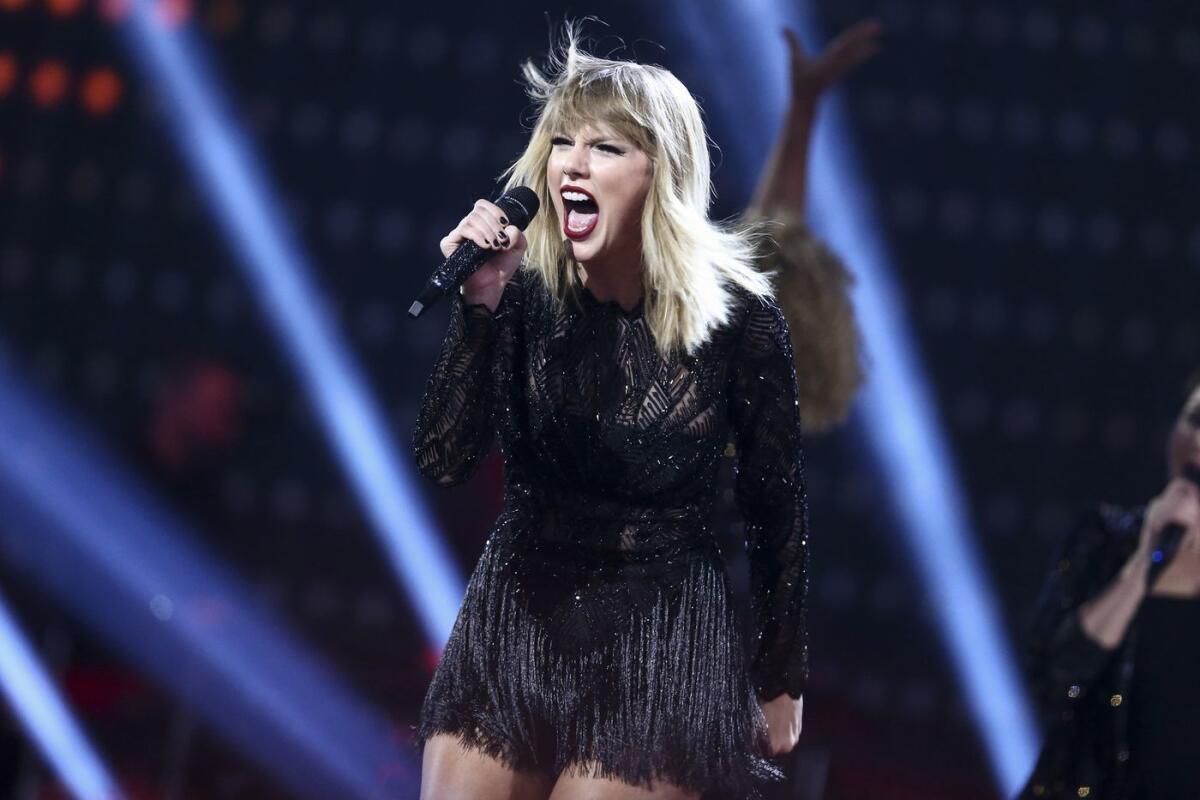Taylor Swift drags Scooter Braun, says she will ‘definitely’ rerecord her old songs

- Share via
Taylor Swifties: Prepare for new takes on old songs.
The 29-year-old singer-songwriter has told “CBS Sunday Morning” reporter Tracy Smith that she will rerecord her catalog in the wake of Big Machine Label Group chief Scott Borchetta’s recent sale of the company — and with it all of Swift’s first six albums — to talent manager Scooter Braun.
“That’s a plan?” Smith asks Swift during the interview slated to air Sunday, Aug. 25.
“Yeah, absolutely,” replied Swift, whose new album, “Lover,” will be released Friday, Aug. 23.
Swift’s spokeswoman could not be reached immediately for comment. No details were offered on whether that constitutes some, most or all of the six studio albums and nearly four dozen singles — 19 of which have reached the top 10 of Billboard’s Hot 100 chart — she has put out since her 2006 debut album, “Taylor Swift,” was released when she was just 16.
Swift publicized her displeasure over Braun’s $300-million purchase of Big Machine when the news surfaced in June, stating that Braun’s control over her recordings constituted “my worst nightmare” because of Braun’s role in the long-running dust-up between Swift and rapper Kanye West and his wife, Kim Kardashian.
“Essentially,” she posted on Tumblr at the time, “my musical legacy is about to lie in the hands of someone who tried to dismantle it.”
Singer Kelly Clarkson quickly went on Twitter urging Swift to record new versions that would give fans an alternative to purchasing those now controlled by Braun.
By rerecording those older songs and releasing them anew, Swift — and presumably her current label, Republic Records — would receive the proceeds from physical and digital sales and streaming revenues, including songwriting royalties. Revenue generated by the original versions will go to Big Machine, and Braun.
Recording contracts, however, usually include a restriction against an artist rerecording songs delivered to a record label under the contract for a certain length of time, entertainment lawyer Ed McPherson of Los Angeles-based McPherson LLP told The Times on Wednesday.
“Typically it’s a period of five years, sometimes much more,” said McPherson, noting that he was not familiar with the specifics of her contract with Big Machine. “But she has some of the best legal representation in the business, so I would expect she has some kind of clout to get around that.”
It’s a strategy other artists have turned to over the decades. During an extended contract dispute with Warner Bros. Records, Prince threatened to re-record his entire catalog but never followed through, releasing only an updated version of his hit single “1999.”
Chuck Berry and Jerry Lee Lewis were among many ’50s recording artists who rerecorded their best-known works with new labels because of contract disputes with the labels for whom they created the original versions. In December, pop singer-songwriter JoJo announced plans to rerelease new versions of her first two albums from 2004 and 2006 to make them available for streaming after her previous label, Blackground Records, withdrew them from streaming services.
In her Tumblr post last month, Swift wrote, “Hopefully, young artists or kids with musical dreams will read this and learn about how to better protect themselves in a negotiation. You deserve to own the art you make.”
More to Read
The biggest entertainment stories
Get our big stories about Hollywood, film, television, music, arts, culture and more right in your inbox as soon as they publish.
You may occasionally receive promotional content from the Los Angeles Times.











